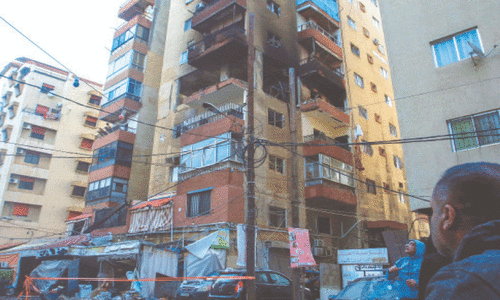CHITRAL: Residents of Chitral have demanded of authorities to replace the gravity-flow drinking water supply and irrigation channel schemes with solar-powered water lifting schemes in riparian villages for the effective utilisation of the Chitral River’s water.
They told Dawn that currently, as the region had mountainous terrain, the residents obtained more than 95 per cent of drinking and irrigation water from village and alpine springs that flowed down to the villages under the force of gravity.
Hamid Ahmad Mir, the former manager of a UNDP-funded project in Chitral, said the Chitral River flowed for more than 400 kilometers after emanating from the Chiantar glacier in Broghil and entered Afghanistan in Arandu village in the south, but hardly five per centof its water was utilised locally.
He said that large sums of money were required to dig up kilometers-long canals from the river to riparian villages to ensure gravity flow of water, with the maintenance of that system being another issue.
DDAC chief says solarisation only solution to drinking, irrigation water issue
“The river runs amuck in summer every year due to the melting of glaciers, which, along with torrential rains, causes devastating floods. During this period, almost all canals are affected by heavy water flow,” he said.
Mr Mir said that flash floods and glacial lake outburst floods washed away headwork of village canals, which connected villages with streams carrying irrigation and drinking water from alpine springs or glacial sources.
He said in such a situation, residents suffered massively due to water shortage, which caused cereal crops, vegetables, and fruit and non-fruit orchards to dry up to the misery of villagers.
The expert said in recent years, climate change had increased the frequency of floods.
“I know of several villages, including Bumbagh in Upper Chitral, which are irrigated by river-based canals but water supply hasn’t been restored for the second consecutive year after disruption due to high floods in the river,” he said.
When contacted, Upper Chitral MNA and chairman of the district development advisory committee Abdul Latif said solar-powered water scheme was the only solution to the drinking and irrigation water issue.
“Solar system will resolve the issue once and for all,” he said.
The DDAC chairman said that in the first phase, low-lying villages could be connected to the river due to low costs and the higher-altitude villages in the second phase.
He said that as the DDAC chairman, he planned to solarise drinking and irrigation water schemes for sustainability and cost-effectiveness.
“Solarisation will save hundreds of millions of rupees every year for the restoration of gravity-based canal and siphon water supply schemes, affected by floods in the summer season, for drinking purposes,” he said.
The DDAC chairman said his immediate priority was to execute a solar-based drinking water scheme in district headquarters Booni in the next fiscal, for which a plan had already been prepared.
Published in Dawn, January 5th, 2025














































